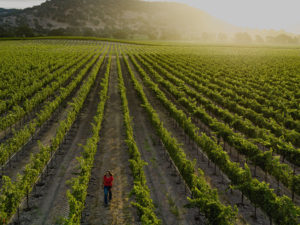At Markham, our roots in Napa Valley’s acclaimed Yountville appellation run deep. In fact, 2025 marks 50 years since our founder, Bruce Markham, acquired our acclaimed Yountville Ranch Vineyard, which was the source for our debut 1978 Markham Cabernet Sauvignon. One of the oldest vineyards in Napa Valley, with a winegrowing history that dates back to 1879, this legendary 78-acre vineyard sits along the southern edge of the Rutherford Bench in the heart of Napa Valley. Featuring well-drained alluvial fan soils underlaid with clay, sand and gravel, it offers an exceptional terroir for the classic Bordeaux red varietals, all five of which are grown at Yountville Ranch.
As the stewards of this historic property, we work diligently to ensure that the vineyard will remain healthy and vital for generations to come, while continuing to produce some of the best wines from Yountville. In addition to earning sustainable certification for Yountville Ranch through the California Sustainable Winegrowing Alliance, we have begun adopting regenerative farming practices at the vineyard, including minimal or no tillage, cover cropping, composting, and the production and use of biochar. Naturally made from vine and plant cuttings, biochar has been shown to increase water retention, enhance soil structure, and improve porosity and microbial life. To further support soil health, we eliminated the use of herbicides several years ago.
Because Yountville Ranch is a relatively low-lying site, after significant winter rains in 2023, several sections of the vineyard remained wet later into the growing season, making the use of tractors less than ideal. After thoughtful consideration and no small amount of research, we decided to try out an age-old technique to improve soil health, without the use of tractors. We brought in nature’s lawnmowers—more than 400 sheep, with a focus on ewes and their baby lambs.
Allowing lambs to graze the cover crops grown between the vine rows at Yountville Ranch has many benefits, all of which align with our move towards regenerative viticulture. These include naturally “mowing” our cover crops and loosening the topsoil and the natural fertilization provided by the lamb manure. Interestingly, by removing organic matter near the bottom of the vines, lambs also help with frost protection. Collectively, these benefits allow us to eliminate one to two rounds of mechanical mowing each year.
We were so thrilled with the results that the lambs are back this year. Owned by a shepherd in Eastern Napa, Yountville Ranch will be home to several hundred hungry lambs beginning in early February into March. This timing is key, as it allows the lambs to feed while there is significant vegetative growth, but before bud break, when the lambs might begin snacking on the tender new shoots. It’s lovely having the lambs on the property. Not only are the babies incredibly cute and fun to hang out with, they are also helping to ensure that our soils are full of nitrogen and microbial life, which in turn makes for healthier, happier vines. For both lambs and wine lovers, it’s a win, win!
